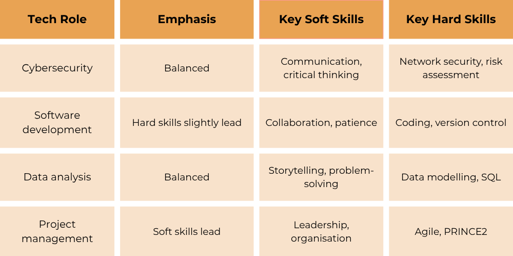What's on this page?
Jump to:
- Hard Skills vs Soft Skills: What's the Difference?
- 15 Examples of Soft Skills
- Why Both Hard and Soft Skills are Essential in Tech
- How Soft Skills Make You More Employable in the Tech Sector
- Which are Harder to Teach - Soft or Hard Skills?
- How to Develop Soft and Hard Skills in Unison
- How to Find the Right Balance for Your Tech Career
- How We Can Help You Develop Soft Skills
Hard Skills and Soft Skills: The Difference and Examples
Hard skills are the technical abilities and specialised knowledge required to perform specific tasks. They’re often measurable and are typically learned through formal education or hands-on experience.
Examples of hard skills in tech:
- Programming languages (e.g., Python, JavaScript)
- Cyber Security frameworks (e.g., CISSP, CompTIA Security+)
- Project Management methodologies (e.g., Agile)
- Cloud platforms (e.g., AWS, Microsoft Azure)
- Data Analysis tools (e.g., SQL, Power BI, Excel)
These are the skills most commonly listed in job descriptions and required to get your foot in the door.
Soft skills, on the other hand, are interpersonal and behavioural abilities that influence how you work and interact with others. They aren’t tied to specific technical knowledge but are crucial for effective collaboration, communication and leadership.
Our Career Adviser on soft skills...
"I think a lot of people I speak to don't think they have soft skills when, in reality, they are just overlooking them. It's become second nature and therefore, people don't register it as a "skill".
In reality, you are practicing and honing those skills every day in life and in work, it's about knowing how to display them and provide appropriate evidence and context on your CV/resume and in interviews to demonstrate how they benefit your potential employer."
15 Examples of Soft Skills
- Communication: Expressing ideas clearly, listening actively, adapting your message for different audiences.
- Problem-solving: Approaching challenges with creativity, logic, resilience.
- Adaptability: Thriving in changing environments and embracing new tools and processes.
- Emotional intelligence: Recognising and managing your own emotions while responding empathetically to others.
- Teamwork and collaboration: Working harmoniously with colleagues to achieve shared goals.
- Leadership: Inspiring and guiding teams, regardless of job title.
- Time-management: Organising and prioritising tasks effectively to make the best use of available time.
- Creativity: Generating unique ideas and innovative solutions by approaching problems from different angles.
- Empathy: Recognising, understanding, and responding to your own and others' emotions in a considerate and supportive way.
- Active listening: Focusing on and understanding another individual's message fully. This includes picking up on non-verbal cues, asking follow-up questions and providing constructive feedback.
- Conflict management and resolution: Identifying the underlying cause of conflict, and then diplomatically coming to a solution that is the best for all parties.
- Critical thinking: Analysing information objectively to make reasonable and fully-informed decisions.
- Stress management and emotional resilience: Staying calm under pressure and quickly adapting to overcome challenges.
- Attention to detail: Approaching work with care and accuracy to ensure that nothing gets overlooked, no matter how small.
- Initiative: Taking action and solving problems without being prompted.
These are the skills that help you navigate real-world workplace scenarios, especially in fast-paced, innovation-driven industries like Tech.

Why Both Hard and Soft Skills are Essential in Tech
While hard skills might land you a job, it’s often your soft skills that determine your growth and long-term success. In tech, professionals frequently work in cross-functional teams or lead complex projects. Without strong soft skills, even the most technically skilled individuals can struggle to perform effectively.
Consider these examples and stats:
- A Cyber Security Analyst needs technical skills to identify threats, but must also communicate clearly with non-technical stakeholders during a crisis. In fact, demand for manager-specific soft skills (such as leadership and communication) has risen by 30% in Australia and New Zealand.
- A Software Developer must know how to code, but also how to collaborate, give feedback and manage time across sprints. Notably, 85% of hiring managers in Australia and New Zealand say skills gaps are directly affecting team performance - and this includes gaps in communication, teamwork, and problem-solving within coding and developer roles.
- A Project Manager uses frameworks and tools, but also motivates teams and manages expectations. According to the Australian Government’s National Skills Commission (NCS), skills related to communication and collaboration are seeing the largest growth. 1.4 million additional hours per week will be needed by 2026, an increase of 12.4%.
Employers increasingly seek candidates who demonstrate both capabilities.
Fact: The Australian soft skills training market is growing
Reaching USD 930 million in 2024, the Australian soft skills market is projected to grow to 2.4 billion by 2033 - that's a compound annual growth rate (CAGR) of 10.1%.
Soft skills are one of the most important skillsets for the Australian job market in 2026, with problem-solving, communication, adaptability, critical thinking, time management, and emotional intelligence being most in demand.

How Soft Skills Make You More Employable in the Tech Sector
As automation and AI continue to evolve, the uniquely human attributes provided by soft skills are becoming more valuable.
For learners entering the workforce or reskilling into tech, mastering soft skills can:
- Improve job interview success
- Enhance leadership potential
- Strengthen workplace relationships
- Boost confidence and presentation skills
Which are Harder to Teach - Soft or Hard Skills?
Hard skills can often be taught through structured courses and certifications. Soft skills, however, require self-awareness, practice, and real-world application. They're developed over time, through experience, reflection, and feedback.
This is why soft skills are sometimes seen as harder to cultivate. But the good news is, they can be developed intentionally.
How to Develop Soft and Hard Skills in Unison
Here’s how you can build both types of skills in tandem:
1. Take courses that combine both
Many Learning People tech training courses embed soft skills into their curricula. Whether you’re studying Cloud Computing, Coding or Cyber Security, our courses include elements like communication training, problem-solving exercises, and real-world scenarios.
2. Seek feedback and mentorship
Ask for input from peers, instructors, or mentors on how you communicate, lead, and collaborate. Constructive feedback helps refine both technical and interpersonal abilities. While many people wait for their formal performance reviews to receive feedback, those who proactively seek it out will sharpen their hard and soft skills faster, and in a way that's aligned with what their colleagues and teammates need.
3. Practise technical skills in team environments
Apply your hard skills in collaborative projects. Working with others gives you the opportunity to enhance communication, adaptability, and emotional intelligence.
4. Reflect regularly
After completing a project or certification, take time to reflect on how you managed your time, resolved challenges, or communicated with your team. Reflection reinforces learning.
How Soft Skills Helped Jose Land a Job in Web Development
Jose got in contact with us as he was looking to upskill to progress his career in Web Development. After completing our Soft Skills training course, he was able to land an exciting new role.
How to Find the Right Balance for Your Tech Career
The ideal balance between soft and hard skills depends on your career path. Regardless of your specialism, focusing on both sets of skills sets you apart in the job market, makes you a more competitive candidate for tech roles, and helps you build a resilient, future-ready career:

How We Can Help You Develop Soft Skills
At Learning People, we believe that true career empowerment comes from developing both technical knowledge and human-centric skills. Our Career Pathways are built to equip you with in-demand hard skills and the power skills employers are actively seeking.
All of our courses in IT, Project Management, Cyber Security, Coding and Data, are designed to build not only your technical foundation but your confidence, collaboration and communication too. So, if you're wanting to future-proof your career by developing your soft skills in 2026, we can help.
Soft Skills vs Hard Skills in Tech FAQs
Related Articles
 Career Progression
Career ProgressionHow to Prepare for a Job Interview (Including for a Career Change)
Learn how to prepare for a job interview, including online and career-change interviews, with practical advice from an experienced career advisor.
Read More Career Progression
Career ProgressionHow to Manage Your Career Development, Progression, and Growth: A Guide
Learn how to take control of your career development, progression, and long-term professional growth with practical steps, planning tips, and expert guidance.
Read More AI
AIThe Uses and Impact of AI in Project Management
Did you know that Project Management is one of the leading sectors in AI transformation and adoption across the globe? Whether you're looking to start or progress your Project Management career, make sure you understand how AI is being used in project-based roles and how this is impacting the industry.
Read More (New) Job Advice
(New) Job AdviceCorporate Jargon and Office Lingo: A List With Explanations and Examples for New-Starters
Corporate jargon or office lingo can be confusing or even intimidating if you're not used to it. This plain-English guide explains common workplace phrases so new-starters can follow conversations with confidence from day one.
Read More

